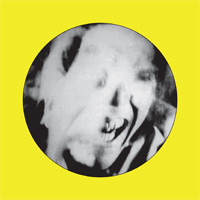
|
"Kurutta Ippeiji (A Page Of Madness)"
DVD (ltd. 300) |
"Kurutta Ippeiji (A Page of Madness)" is a silent film created by the Japanese director Teinosuke Kinugasa in 1926. The screenplay was written together with Yasunari Kawabata, a celebrated representative of the avant-garde literary movement of Neo-Perceptionists known as "Shinkankanu", who would later win the Nobel Prize for Literature in 1968. Considering the overall traditional orientation of the Japanese cinema of that time, the film greatly surpassed all concepts about experimental art and made a big sensation among critics although remained almost unnoticed by the masses.
The story unfolds in a mental asylum where a woman is kept after her attempt to drown her own daughter. Her husband, a former sailor, takes a job there as a janitor in hopes of eventually rescuing his wife from captivity but soon he himself starts loosing his mind… The film includes striking scenes of the emotions of characters, also those of asylum patients whose insane visions are shown using unconventional analogue special effects, which still produce quite a psychoactive impact even on the modern viewer.
The short film screening in 1926 was accompanied by live musicians playing and comments from "benshi" - professional narrators who have put semantic accents in the story, but there is no information about the original music score. At different times several soundtracks for the movie were composed, all in different styles - from classical taiko drums and jazz interpretations to indie rock and experimental electronics.
Backed by the successful experience of recording soundtracks for silent cinema (let us recall "The Space Voyage" from 1936 directed by N. Zhuravlev), St. Petersburg's duo Vetrophonia continues to contribute to the legacy of avant-garde cinematography in its trademark retro-futuristic style. With the use of electronics, archival samples, classical strings, brass and self-built metallic instruments Nikolay Sudnik and Alexander Lebedev-Frontov managed to create a sound canvas ideally fitting every scene of the film. The soundtrack is made both with meticulous approach and light humour, it follows all changes of moods and guarantees a truly unique watching experience enhancing both visual and emotional sides of this masterpiece of the Japanese silent cinema.
Reviews
Latter-day Dadaists-slash-Futurists Vetrophonia score the rare silent-era motion picture Kurutta Ippeiji (A Page of Madness) by Teinosuke Kunugasa, made in 1926 and co-written by a coterie of avant-garde litterateurs including future Nobel laureate Yasunari Kawabata. The original print was lost for almost half a century before being rediscovered by the director himself in 1971, who re-released it with a new score. Thus, it is fitting that its DVD debut feature yet another updated soundtrack.
Cherished by cineastes as one of few survivors of the Japanese silent era, time, misadventure and changing traditions have only added to its mystique—a full quarter of the original has been lost to inexplicable editing and their are no intertitles, since in Japanese movie houses of the era, a live narrator served to guide the audience. Viewed without a cheat sheet, the plot, a family tragedy played out in an insane asylum, becomes frankly incomprehensible after the first five minutes.
None of these circumstances however make the hour-long reconstructed remnant less of an experience. Kunugasa’s camera moves fluently and strikingly in turn. His allegiance to a school of artists determined to transform film from a delivery system for naturalism is on wild and glorious display. In one particularly effective and memorable scene, the women are shown displaying every imaginable emotion in a sweeping montage, while throughout the film, the male inmates exhibit little more than feral aggression.
Russian duo Nick Soudnik and Alexander Lebedev-Frontov make like a two-man intonarumori manhandling an entire orchestra worth of instruments and radiophonic workshop full of effects. While deftly flirting with Japonism and sometimes quite literal in reflecting the images on the screen, their expressive sensitivity instills the images with the strong storyline it lacks.
|
|
© 2002-2022
Radionoise.ru |
